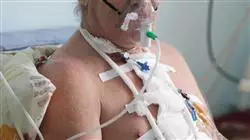University certificate
The world's largest faculty of nursing”
Introduction to the Program
The study of the Respiratory Microbiota opens a door to the knowledge of multiple diseases, bringing great value to the curriculum of the nursing staff"

For a long time, researchers used to defend the view that healthy lungs were sterile lungs, but the existence of microorganisms in these organs, in a balanced way, allows for good health and even protection from certain pathologies.
Delve into the main ecosystems that are differentiated in the oral cavity, its characteristics and composition, will allow the nurse to assume a performance according to the patient's requirements and in support with the medical professional who determines a precise diagnosis and therapy.
When the composition of the pulmonary microbiota presents an imbalance, Dysbiosis appears and this Diploma will also address the predisposing factors to oral Dysbiosis, as well as the influence of external agents in Eubiosis and oral Dysbiosis.
As part of the central theme of this program, we will review the latest evidence regarding the structure of the respiratory tract and the composition of the microbiota and microbiome, the factors that regulate them and the relationship of their alteration with the different diseases of the respiratory tract.
A complete syllabus that is presented 100% online, under the Relearning methodology, the most avant-garde system of study at present and with all the resources that the professional needs to advance in a comfortable way and with the quality he/she desires.
By enrolling in this Postgraduate certificate you will enter a new style of study and enjoy the best academic experience 100% online"
This Postgraduate certificate in Respiratory Microbiota and Allergies for Nursing contains the most complete and up-to-date scientific program on the market. The most important features include:
- The development of case studies presented by experts in Human Microbiota for Nursing
- The graphic, schematic, and practical contents with which they are created, provide scientific and practical information on the disciplines that are essential for professional practice
- Practical exercises where the self-assessment process can be carried out to improve learning
- Its special emphasis on innovative methodologies
- Theoretical lessons, questions to the expert, debate forums on controversial topics, and individual reflection assignments
- Content that is accessible from any fixed or portable device with an Internet connection
You will analyze the main oral ecosystems and the microorganisms that inhabit them to determine the influence on certain diseases"
The program’s teaching staff includes professionals from sector who contribute their work experience to this educational program, as well as renowned specialists from leading societies and prestigious universities.
Its multimedia content, developed with the latest educational technology, will provide the professional with situated and contextual learning, i.e., a simulated environment that will provide an immersive education programmed to learn in real situations.
The design of this program focuses on Problem-Based Learning, by means of which the professional must try to solve the different professional practice situations that are presented throughout the academic course. For this purpose, the student will be assisted by an innovative interactive video system created by renowned experts.
You will delve into the current lines of research on Respiratory Microbiota and Allergies for Nursing in just 6 weeks"

You will be able to earn your degree without sacrificing any of your current activities or extra study hours"
Why study at TECH?
TECH is the world’s largest online university. With an impressive catalog of more than 14,000 university programs available in 11 languages, it is positioned as a leader in employability, with a 99% job placement rate. In addition, it relies on an enormous faculty of more than 6,000 professors of the highest international renown.

Study at the world's largest online university and guarantee your professional success. The future starts at TECH”
The world’s best online university according to FORBES
The prestigious Forbes magazine, specialized in business and finance, has highlighted TECH as “the world's best online university” This is what they have recently stated in an article in their digital edition in which they echo the success story of this institution, “thanks to the academic offer it provides, the selection of its teaching staff, and an innovative learning method aimed at educating the professionals of the future”
A revolutionary study method, a cutting-edge faculty and a practical focus: the key to TECH's success.
The most complete study plans on the university scene
TECH offers the most complete study plans on the university scene, with syllabuses that cover fundamental concepts and, at the same time, the main scientific advances in their specific scientific areas. In addition, these programs are continuously being updated to guarantee students the academic vanguard and the most in-demand professional skills. In this way, the university's qualifications provide its graduates with a significant advantage to propel their careers to success.
TECH offers the most comprehensive and intensive study plans on the current university scene.
A world-class teaching staff
TECH's teaching staff is made up of more than 6,000 professors with the highest international recognition. Professors, researchers and top executives of multinational companies, including Isaiah Covington, performance coach of the Boston Celtics; Magda Romanska, principal investigator at Harvard MetaLAB; Ignacio Wistumba, chairman of the department of translational molecular pathology at MD Anderson Cancer Center; and D.W. Pine, creative director of TIME magazine, among others.
Internationally renowned experts, specialized in different branches of Health, Technology, Communication and Business, form part of the TECH faculty.
A unique learning method
TECH is the first university to use Relearning in all its programs. It is the best online learning methodology, accredited with international teaching quality certifications, provided by prestigious educational agencies. In addition, this disruptive educational model is complemented with the “Case Method”, thereby setting up a unique online teaching strategy. Innovative teaching resources are also implemented, including detailed videos, infographics and interactive summaries.
TECH combines Relearning and the Case Method in all its university programs to guarantee excellent theoretical and practical learning, studying whenever and wherever you want.
The world's largest online university
TECH is the world’s largest online university. We are the largest educational institution, with the best and widest online educational catalog, one hundred percent online and covering the vast majority of areas of knowledge. We offer a large selection of our own degrees and accredited online undergraduate and postgraduate degrees. In total, more than 14,000 university degrees, in eleven different languages, make us the largest educational largest in the world.
TECH has the world's most extensive catalog of academic and official programs, available in more than 11 languages.
Google Premier Partner
The American technology giant has awarded TECH the Google Google Premier Partner badge. This award, which is only available to 3% of the world's companies, highlights the efficient, flexible and tailored experience that this university provides to students. The recognition as a Google Premier Partner not only accredits the maximum rigor, performance and investment in TECH's digital infrastructures, but also places this university as one of the world's leading technology companies.
Google has positioned TECH in the top 3% of the world's most important technology companies by awarding it its Google Premier Partner badge.
The official online university of the NBA
TECH is the official online university of the NBA. Thanks to our agreement with the biggest league in basketball, we offer our students exclusive university programs, as well as a wide variety of educational resources focused on the business of the league and other areas of the sports industry. Each program is made up of a uniquely designed syllabus and features exceptional guest hosts: professionals with a distinguished sports background who will offer their expertise on the most relevant topics.
TECH has been selected by the NBA, the world's top basketball league, as its official online university.
The top-rated university by its students
Students have positioned TECH as the world's top-rated university on the main review websites, with a highest rating of 4.9 out of 5, obtained from more than 1,000 reviews. These results consolidate TECH as the benchmark university institution at an international level, reflecting the excellence and positive impact of its educational model.” reflecting the excellence and positive impact of its educational model.”
TECH is the world’s top-rated university by its students.
Leaders in employability
TECH has managed to become the leading university in employability. 99% of its students obtain jobs in the academic field they have studied, within one year of completing any of the university's programs. A similar number achieve immediate career enhancement. All this thanks to a study methodology that bases its effectiveness on the acquisition of practical skills, which are absolutely necessary for professional development.
99% of TECH graduates find a job within a year of completing their studies.
Postgraduate Certificate in Respiratory Microbiota and Allergies for Nurses
In recent times, numerous studies have been carried out on the Intestinal Microbiota and its impact on the Health of people, in particular its relationship with allergies and intolerances, and how certain dietary changes can influence it. Therefore, nursing professionals must be aware of these advances and master in depth how a negative alteration in the patient's microbiota can favor the appearance of certain pathologies. In this sense, TECH has created a Postgraduate Certificate in Respiratory Microbiota and Allergies for Nurses by the hand of the best specialists to provide nursing students with a detailed and updated teaching on this area.
Hone your decision making when managing the Respiratory Microbiota
After completing this Postgraduate Certificate in Respiratory Microbiota and Allergies for Nurses, the graduate will have the knowledge and confidence to make sound decisions in the management and treatment of patients. This 6-week or 100-hour program focuses on the most specialized content in the field of modern medicine and provides new skills and competencies to the student. In this sense, the program consists of a study module that delves into diseases such as Eosinophilic Esophagitis, Lactose Intolerance, alteration of the intestinal Microbiota in celiac patients and the role of probiotics and prebiotics in the recovery of the Microbiota in gluten intolerant and celiac patients. In addition, the curriculum has been designed by the most expert teachers in the field, who share their most up-to-date experiences in each of the cases presented. With a variety of multimedia resources available, students can visualize and assimilate the concepts in an online format that gives them the freedom to manage their study sessions.







